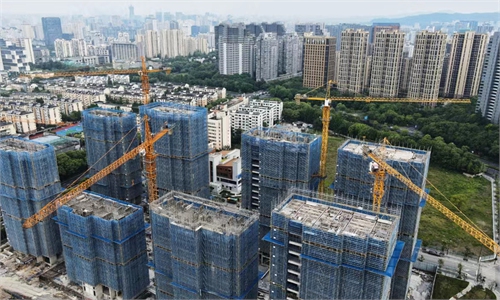
Illustration: Chen Xia/GT
China's sweeping moves released in recent days to increase support for real estate have aroused fierce discussion, with some Western economists assuming that policy-easing measures could pose risks to banks operating in lower-tier cities. These worries are unnecessary.
Western economists often make incorrect predictions when explaining the Chinese economy. In hindsight, they either misread the Chinese economy or drew wrong conclusions on the basis of Western economic theory in most cases. It reflects the West's lack of understanding of the Chinese economy.
China's real estate sector is a typical example. S&P Global said on Monday that measures such as cutting down payment requirements and removing the floor for mortgage rates are expected to temporarily increase property demand, but "the increased leverage could also cause an uptick in mortgage defaults," according to Reuters.
The memory of the US subprime mortgage crisis is still fresh for many Western economists. From this perspective, it is understandable that S&P Global issued a warning about measures to cut down payment requirements.
Before the US subprime mortgage crisis, financial institutions were keen on backing low- or no-down-payment loans for borrowers with lower credit scores, stimulating consumers' use of high leverage. So, there was excessive speculation betting on a continuous rise in housing prices. Easy credit, together with other factors, ultimately led to a financial tsunami in the US.
The same scenario won't play out in China, because the situation is totally different. Generally speaking, in a downward market, fewer people will engage in real estate investment and speculation to bet on a rise in housing prices. So, with China's housing market cooling down, moves to cut down payment requirements are designed to drive inelastic demand rather than investment and speculation.
Influenced by traditional Chinese culture, people in China have "inelastic demand" for housing, because most Chinese people hope to live in a place they own, instead of living in a rented house forever.
Amid a cooling home market, it is appropriate to reduce the down payment ratio and cut housing loan interest rates so that more people with relatively low incomes are able to purchase a house. In this case, easy credit can not only help stabilize the real estate market, but also improve people's lives, promote social equity and boost balanced development.
The logical processes behind the credit easing approaches adopted by China and the US were different. In the US subprime mortgage crisis, a flurry of credit-easing measures to boost lending to American investors and speculators was simple market behavior manipulated by capitalists, who made profits by pushing up housing prices and securitizing real estate loans.
It is completely different from what has happened in China. The country's recent moves to cut down payment requirements are aimed at unleashing the demand of ordinary home buyers and improving people's lives.
Credit easing is just one of the stimulus policies China has rolled out, which will work together to have comprehensive effects on the economy. China's potential growth rate is expected to remain in a reasonable range. It means that the disposable incomes of Chinese citizens will continue to grow.
As long as wages keep rising, there won't be a large number of people deliberately refusing to repay their home loans, even if there is a small degree of fluctuation in housing prices. Therefore, credit easing won't result in an uptick in mortgage defaults.
China's real estate stimulus policies come as the country ramps up efforts to raise people's living standards, propel industrial and consumption upgrades, and promote high-quality economic development. The real estate sector is an integral part of China's high-standard and high-quality development.
The government has enough tools to maintain stability in the real estate market and avoid systemic risks resulting from mortgage defaults.
The author is a reporter with the Global Times. bizopinion@globaltimes.com.cn



